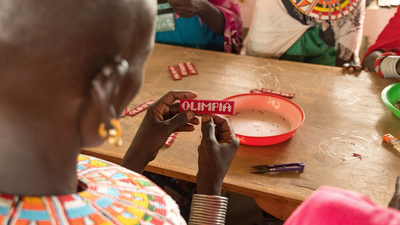


Kenyan small businesses produce more goods, faster using Lean methodology
Small and medium-sized enterprises (SMEs) in Kenya have increased their productivity and are delivering goods to customers more quickly after introducing the Lean methodology into their processes.
Through a series of three workshops, most recently held on 20-21 January in Nairobi, the chief executive officers and managers of Greenforest Foods, Mace Foods, and Stawi Foods and Fruits learned to analyse their production and delivery processes and eliminate inefficiencies – such as waiting time, over-processing and unnecessary movements – to become ‘leaner’.
Lean improvements can be simple and done at minimal costs. For example, using buckets with gauges, rather than scoops, to fill honey jars reduces motion and speeds up the packaging process. Establishing controlled and defined stock levels enables quicker delivery to customers, as does rearranging the factory layout to ensure minimum transport.
The workshops were organized by Bosch and the International Trade Centre (ITC) in partnership with the Kenya Institute of Supplies Management (KISM) and Karlsruhe Institute of Technology as part of ITC’s ‘Promoting Intra-Regional Trade in Eastern Africa – Kenya’ project, funded by the Government of Finland and contribution in kind from Bosch.
Mace Foods, an exporter of dried chillies and vegetables, increased packing production by 92% since July 2014, with operators packing 46 sachets every hour, rather than 24 sachets. The number of defective products dropped to zero.
The order lead time (measured from the time an order is received until a product is dispatched) for dried chillies and vegetables decreased from more than four days to within a day. At the same time, the number of orders and sales increased. In December, the supermarket chain Nakumatt, which had previously halted orders, began ordering again from Mace Foods.
‘It means we have systems in place,’ said Margaret Komen, Chief Executive Officer (CEO) of Mace Foods. ‘I know if an order comes, there is a checklist that is followed and the procedure is followed and I’m sure the order is delivered.’
The honey packaging company Greenforest Foods improved packing production by 28%, with operators packing nearly 10 one-kilogram cartons every hour, an increase from just over seven cartons. The order lead time dropped from 13 hours to 7.3 hours.
Stawi Foods and Fruits, a food-processing company specializing in porridge flours, improved order lead time from seven days to one day after identifying the need for and establishing controlled stock levels. The time it takes for an operator to fill a one-kilogram packet of flour decreased from one minute to 30 seconds after the introduction of a standard one-kilogram scoop.
‘Lean looks at how to improve your processes without investing huge amounts of machinery or equipment to improve productivity,’ said Hong Siew Lim, Programme Manager of ITC’s Modular Learning System in Supply Chain Management. ‘It’s about looking at how to reduce bottlenecks, simplifying processes or even reducing duplication or unnecessary waiting time.’
‘The SMEs take complete ownership of the measures that we define in the workshops,’ said Georg Nicola, Bosch Project Leader. ‘We teach some methods, but then the participants take over and apply them to their own environment. We go together on the shop floor and actually practice these methods, so it helps them to identify potential to improve their processes and reduce waste, as well.’
Through the workshops, KISM developed the capacity to train and advise businesses on Lean improvements in their production and order fulfilment processes. It will serve as a multiplier of Lean improvements for SMEs in the country.
‘Every large corporation was an SME at one point or another,’ said Hedwig Nyalwal, CEO of KISM. ‘So we are optimistic that the SMEs that are participating in this now will grow and continue to practice the Lean techniques and perfect them. We’ll be there to work with them.’
Bosch and ITC are planning to offer this training in other countries, working with local partners to ensure sustainability of the project.















